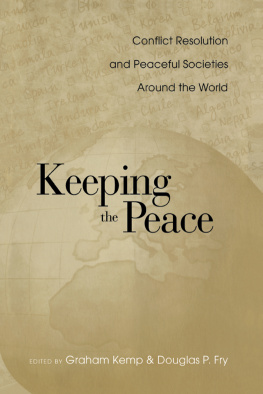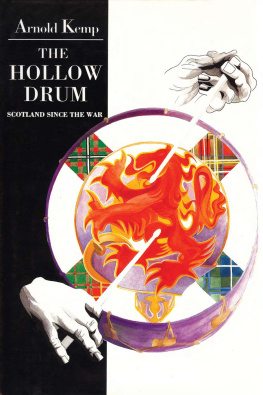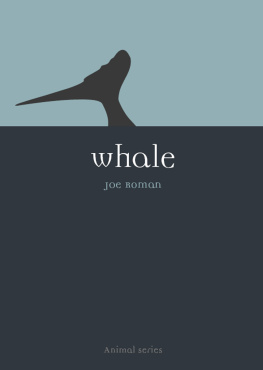FLOATING GOLD
A NATURAL (AND UNNATURAL) HISTORY OF AMBERGRIS
CHRISTOPHER KEMP
The University of Chicago Press Chicago & London
CHRISTOPHER KEMP is a molecular biologist. He currently lives in Grand Rapids, Michigan, with his wife and two sons. He can be contacted at
The University of Chicago Press, Chicago 60637
The University of Chicago Press, Ltd., London
2012 by The University of Chicago
All rights reserved. Published 2012.
Printed in the United States of America
21 20 19 18 17 16 15 14 13 12 1 2 3 4 5
ISBN-13: 978-0-226-43036-2 (cloth)
ISBN-10: 0-226-43036-7 (cloth)
ISBN-13: 978-0-226-43037-9 (e-book)
Library of Congress Cataloging-in-Publication Data
Kemp, Christopher.
Floating gold: a natural (and unnatural) history of
ambergris / Christopher Kemp.
pages. cm.
ISBN 978-0-226-43036-2 (cloth: alkaline paper)
ISBN 0-226-43036-7 (cloth: alkaline paper)
1. Ambergris. I. Title.
QD331.k457 2012
333.95'95dc23
2011050637
 This paper meets the requirements of ANSI/NISO z39.48-1992 (Permanence of Paper).
This paper meets the requirements of ANSI/NISO z39.48-1992 (Permanence of Paper).
For
EMELINE, MAX, & IZZY,
my fellow ambergris hunters.
This is a record of the time.
In Memory of
DR. ROBERT CLARKE
(19192011)
Who would think, then, that such fine ladies and gentlemen should regale themselves with an essence found in the inglorious bowels of a sick whale! Yet so it is. * HERMAN MELVILLE, Moby-Dick (1851)
An ignorant Fellow in Jamaica, about two Years ago, found 150 Pound Weight of Ambergreece dashd on the shoar, at a Place in these parts called Ambergreece Point, where the Spaniards come usually once a Year to look for it. This vast Quantity was divided into two Parts; supposed by Rolling and Tumbling in the Sea. This Man tells me that tis produced from a Creature, as Honey or Silk. And I saw in sundry places of this Body, the Beaks, Wings, and part of the Body of the Creature, which I preserved some Time by me. He adds, That he has seen the Creatures alive, and believes they swarm as Bees, on the Sea shore, or in the Sea. * Philosophical Transactions and Collections, to the End of the Year, 1700
Dear Dr. Clarke,
I did have another question for you. Ive always pronounced ambergris without the s at the end, like the French from which the name is derived. Like this: ambergree. Others Ive spoken with have pronounced the s, but softly, like this: ambergrizz. How do you pronounce it?
All the very best!
ck
Dear Mr. Kemp,
Like all those with whom I have spoken about ambergris I pronounce the word like this: ambergreez, and I recommend that you do the same. After all, you are not French, are you?
Yours,
Robert
CONTENTS
PROLOGUE: WELLINGTON, 2008
On Saturday, September 20, 2008, the excitement was beginning to grow on Breaker Bay, near Wellington, New Zealand. Although it was early spring and still cool, a crowd had gathered to investigate a strange object that had washed ashore during the night. It was large, perhaps the size of a 44-gallon drum, and weighed an estimated thousand pounds or more. No one had seen it arrive. It was just there on the sand. Roughly cylindrical in shape, it was the color of dirty week-old snow.
On the following Monday, national news media were beginning to report the arrival of the object on the beach. To the people who live in the Wellington suburbs near Breaker Bay, the news reports were hopelessly late in coming. Everyone already knew about the object. It had been sitting incongruously on the beach for the last two days. Hundreds of people had already wandered over to take a look at it. Seagulls had been pecking at it as it slowly settled into the sand. Rumors spread quickly through the coastal communities around the bay. It was, one of the prevailing opinions stated, a large piece of cheese. In fact, people said, it was probably Brie. It must have been dumped on the beach by the notoriously rough waters of Cook Straita large cylinder of soft cheese swept toward the bay from the busy shipping lanes. Perhaps, some people suggested, it was industrial soap. Others asked: Could it be some kind of meteorite?
And then the situation became stranger still. People were now taking pieces of the object, carving off large heavy servings of it with whatever tools they could find. They then took their samples home, protecting them from decomposition and from the further attention of curious seagulls.
At night I watched the news reports with growing amazement. What would make people act this way? Six months earlier, my wife and I had moved from the United States to Dunedin, a midsize coastal city that sits near the southernmost tip of New Zealands remote and rain-swept South Island. I was working as a biologist at the University of Otago, a large research institution in the city, and so was my wife. As relative strangers, we wondered aloud to each other if this behavior was particular to New Zealand. Perhaps its an aspect of the national character, we said, to act this way when something unusual washes ashore.
But another rumor had begun to circulate: The mysterious object was ambergris.
Im pretty sure this is ambergris, Geraldine Malloy told a television news reporter breathlessly. I think its the find of a lifetime. Ive been looking for it for a long time. She was standing over the object, wearing a windbreaker and using a long-handled shovel to break off smaller pieces from the whole.
Before September 2008, I had never even heard of ambergris before. Now I sat transfixed, as people almost rioted on the beach, armed with garden tools, trying to obtain just a small piece of it. It was one of the strangest sights I had ever witnessed, and I was determined to learn more. I discovered that ambergris is excreted only by sperm whales, and it is rare and extremely valuable. In fact, ambergris is valuable enough that rushing to Breaker Bay armed with a long-handled shovel to break off some smaller pieces from the whole was a reasonable investment of Malloys time. Used as an ingredient in the manufacture of perfumeand for more esoteric purposes in more distant placesambergris is traded on the open market for up to $20 per gram, depending on its quality. As a useful reference, gold is currently trading at around $30 per gram. Unlike gold, people occasionally report finding ambergris on remote beaches in lumps that weigh more than fifty poundsor $500,000 worth. And at $20 per gram, the object being enthusiastically divided up by the crowd at Breaker Bay was worth around $10 million.
Ambergris becomes more valuable as it ages. A well-aged piece of ambergris is unusual, and the arrival of a well-aged piece the size of the strange object on Breaker Bay would have been a singular event. It would have been comparable to finding a lump of gold the size of a suitcase in the middle of a well-traveled path. No one on the beach seemed certain that the object was ambergris, but no one was taking any chances that it wasnt, either. The crowd grew larger. People arrived with bedsheets, which they used as makeshift slings to transport bowling ballsize pieces of the object home. Those managing to secure even a handfula greasy wet piece weighing maybe a pound or sowere potentially taking home $5,000 worth of ambergris.
The excitement continued to grow throughout the day. So many people have rung in saying, Its worth half a million dollars," Wellington City Council spokesman Richard MacLean told the New Zealand Herald, we feel honor-bound to actually go out and stake our claim on it.
And then on Tuesday morningjust three days after its arrivalno sign remained to prove that the object was ever there. The crowd had removed it, piece by piece and pound by pound, with their shovels, bags, and improvised slings. All around Breaker Bay and farther afield, in suburbs across the city, people were celebrating their sudden and unanticipated wealth.
Next page












 This paper meets the requirements of ANSI/NISO z39.48-1992 (Permanence of Paper).
This paper meets the requirements of ANSI/NISO z39.48-1992 (Permanence of Paper).